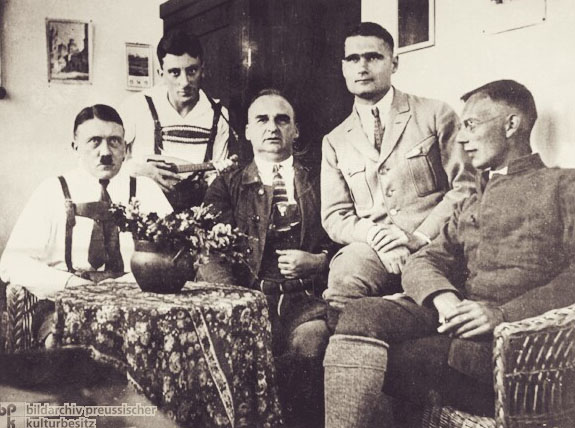
In 1923, Adolph Hitler and a small group of malcontents staged an uprising in the city of Munich, Germany, an event that later became known as the Beerhall Putsch. The violence of the event was quickly suppressed by the local police, and Hitler was subsequently jailed for his role in the event. Notably, while imprisoned, he wrote Mein Kampf (My Struggle) in which he outlined his vision for Germany mixed with his hatred for the Jews. It’s also worth noting that Heinrich Himmler, a police official in Munich, was later designated by Hitler to lead the Nazi SS, an elite corps of the military which used the symbol of a skull and crossbones on their uniforms and carried out the program of terror upon which the Nazi regime depended.
My wife and I visited Munich a number of years ago, and spent some time walking around the city while staying at a nice Four Seasons Hotel. Only while there did I learn that the hotel had been the favorite meeting place in the 1920s for a select group of Nazi sympathizers and supporters. Combined with coming across the same beer hall at which the Putsch had taken place, where festive groups of tourists and locals were swigging beer and eating sausages, I’ll admit to growing feelings of discomfort. These feelings reached a climax after our visit to Dachau, the notorious concentration camp at which political prisoners, Jews, “deviants” and others were held captive and exterminated. The most disturbing moment happened while reading a letter on display in the museum from the camp doctor’s wife to Himmler, in which she talks about the important work her husband is doing and gushes praise for a gift of chocolates sent by Himmler. I felt relieved to leave Munich.
Today when asked by a reporter if he would support a peaceful transfer of power after the election, Donald Trump demurred, and indicated that he is working to throw out ballots and citizen votes to sway the upcoming election results. His comments were buttressed by reports that the Trump campaign is working with Republicans in battleground states to develop a strategy of tossing out voter balloting in favor of naming “loyal electors” to the Electoral College. Among the Republicans in congress, only Mitt Romney condemned those tactics and sentiments. America’s Putsch is now in operation.
For most of my lifetime I’ve wondered how it is that Fascism came to Germany, a country that produced great philosophers, artists, musicians and scientists, and in the 1920s had the finest health care system in the world. I’ve wondered how the German people let a small group of racist, violent fanatics take over the government, and why it was allowed to happen. Now I see it happening in America, and my questions are being answered. One answer has to do with how decent people respond to indecency, and the fear they have of becoming indecent themselves, what I call the tolerance of intolerance.
The tolerant among us, what the right-wingers call “liberals,” see the world in its complexity, understanding that the forces that motivate people and fuel behavior are multifaceted. This understanding of complexity produces appreciation of openness and vulnerability, and an unwillingness to use the levers of power ruthlessly. For the likes of Trump and Hitler, power is a blunt weapon, wielded without regret. So here we are: America’s Putsch is happening. The moment of truth is upon us.
Larry, I believe that you have drawn an accurate comparison between these two critical periods in history. I only hope that we Americans can rise to the moment in a clear and effective manner to say no to the “Know Nothing” mentality that has placed us on this dangerous precipice. Thanks for your thoughtful writing.
i visited dachau in the 1950’s, and was surprised to find out that the barracks here prisoners had been kept had been converted to housing for homeless germans. there was also a post office.
otherwise a grim place.
i liked munich though. it hadn’t been a nazi stronghold and had already, when i was there, become again a center of german music – opera, operetta, clubs, etc.